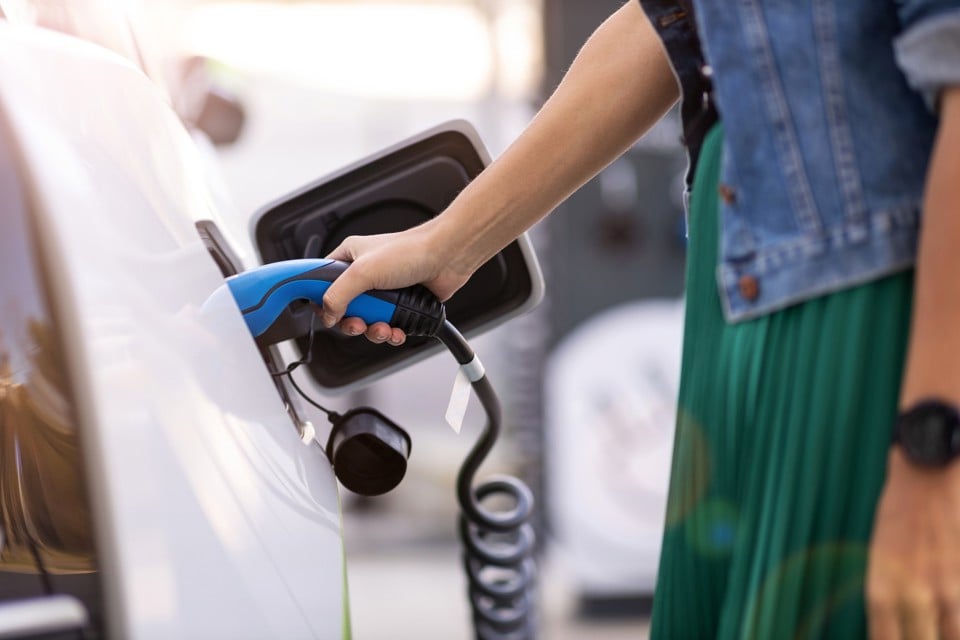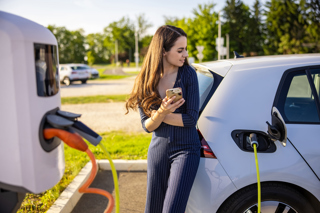The new trade body, representing electric vehicle (EV) charge point operators (CPOs) in the UK, has vowed to work with Government to address fleet concerns.
ChargeUK, which launched last month (April 2023), brings together 20 of the country’s largest CPOs.
Speaking to Fleet News following ChargeUK’s launch, Ian Johnston (pictured below), chair of ChargeUK and CEO of Osprey Charging Network, says that he recognises the issues fleets are facing, particularly around accessibility for van operators.
The Association of Fleet Professionals (AFP) has previously voiced its concerns about a lack of charging infrastructure for van operators.
Typical charging bays cannot accommodate a large van, with research from the Society of Motor Manufacturers and Traders (SMMT) suggesting van operators were deferring their switch away from diesel to electric, because of charging infrastructure concerns.
Johnston says that members recognise it is an issue for fleets but are often constrained by planners.
He explained: “We're in a difficult spot at the moment, because there are some very high expectations on the charging operators, but we can only install what we are given the space to install by the landlords and by the local authority.
“We’re being asked to comply with accessibility standards when deploying in local authority areas, but then they are refusing to change the bay size of their on-street bays or car park bays.”
Working with Government
Johnston believes that this issue and many others facing the industry now stand a better chance of being resolved by CPOs speaking with one voice.
He said: “Over the past six months working with Government on consumer regulation, on the rapid charge fund, and the ZEV mandate, it became very clear, we were all saying the same thing, but we needed to say it as one.”
He continued: “Across the membership right now there are thousands of chargers that we're trying to deploy and get live on the ground that drivers want, businesses want, Government want, and we can’t get them live, because there are things in the system that are stopping us.
“What we all have in common is that the grid is not moving quick enough for any of us and the planning is not moving quick enough for any of us.”

“There are literally billions of pounds signed-off to put charging infrastructure on to every street and in every car park, but it's the process that's the problem, not the money,” Ian Johnston, ChargeUK
Resourcing rollout of infrastructure
The Government expanded its Local Electric Vehicle Infrastructure (LEVI) pilot, with 16 more councils receiving funding to deliver new charge points in February.
Last year, ministers announced that nine local authorities would receive a share of £20 million to install more than 1,000 public charge points.
In total, £22m of Government funding for the pilot areas is supported by an additional £17m of private sector investment, and £2m from public funds across local authorities.
It also announced £8m to help councils deliver charging infrastructure in the long term through the LEVI Capability Fund. It aims to equip local authorities with the skills and ambition to scale up their plans when it comes to their charging strategy.
Johnston said: "We welcomed the LEVI fund and the contribution it can make to local authorities, but also importantly, the fact that there's now funding to resource these rollouts.”
He continued: “For many local authorities right now, they have a long list of priorities and procuring EV charging infrastructure may not be at the top of the list. But what ChargeUK can show these local authorities is that there is a thriving private market that has the expertise and the funding to deploy infrastructure across all of the local authority locations.
“What we are urging Government to do is to give more support to those local authorities who haven't got the human resource or the expertise to procure our services.
“There are literally billions of pounds signed-off to put charging infrastructure on to every street and in every car park, but it's the process that's the problem, not the money.”
It is a major priority for the new trade body. Johnston explained: “One of our biggest asks for Government is to make sure that there is sufficient resource in the planning authorities, in the grid operators and in the highways’ teams, because that's where we still have problems today.
“We welcome the LEVI fund for resource, but we need so much more resource in those bodies, because they are the bodies that sit in the way of us making chargers live today or getting them into the ground.”
Making the UK EV-ready
UKCharge says another of its priorities will be working with Government on the zero-emission vehicle (ZEV) mandate.
“We want to make sure that the UK is seen as an attractive market for the OEMs to send the electric vehicles that they're manufacturing to, so that we can bring down the lead times of electric vehicles to create a large used car market for drivers and fleets,” said Johnston.
Furthermore, he wants the trade body to play a role in bringing down the cost of charging an EV. He explained: “We want to make sure that we have equity for people, whether you have access to a driveway or a depot or not and the easy quick win here for Government is to equalise the VAT rate, from home to public charging, bringing it all down to 5%.”
Infrastructure investment
ChargeUK says its members are planning to spend £6 billion on EV charging infrastructure by 2030, with tens of thousands of new chargers installed this year, with the aim of doubling the size of the network through 2023.
“The real situation on the ground in 2023, is there is a wave of deployment across the country, in all forms (of chargers),” said Johnston.
“The state of the UK’s charging infrastructure by the end of this year will be so very different to what we saw at the end of last year.”
“The projects that our members are contracted to deliver alone, will double the size of the network.
“Whether we can get those turned on by the end of the year, will come back to those barriers in the system, but if there are drivers out there who have historically had concerns, they will see a vast change and improvement in infrastructure coming.”
Dealing with negativity
However, Johnston acknowledges that part of ChargeUK's remit will be to counter what he describes as "scaremongering" stories published by sections of the UK media.
“We will reassure drivers and businesses and fleets that the infrastructure is coming, because they’re going to see a vastly different landscape by the end of the year, but also, we’re now going to provide the right messaging into the media and into the public domain about what's really happening on the ground,” he said.
The total number of publicly available EV charge points increased by 3,095 in the first quarter of this year, up 8% compared to the start of January, according to latest data from DfT.
Charge points rated as ‘rapid’ (25-100kW) or above, increased by 760, a rise of 11% on the last quarter’s figures.
As of April 1, there were 40,150 public EV charging devices installed in the UK, with 7,647 rated ‘rapid or above – 19% of all charging devices – while 22,338 were rated as ‘fast’ chargers (7-22kW), some 56% of all charging devices
Year-on-year, the number of installed public devices has increased by 9,860, a 33% increase.
Johnston concluded: "The right solution for the UK going forward is having the right type of infrastructure in the right places, be that slow chargers in a depot, be that ultra-rapid chargers on a highway or lamppost charges on the street."
"Talking about a ratio of charges to vehicles ignores the fact that the majority of vehicles will either be charged at people's homes or in depots.”























Login to comment
Comments
No comments have been made yet.